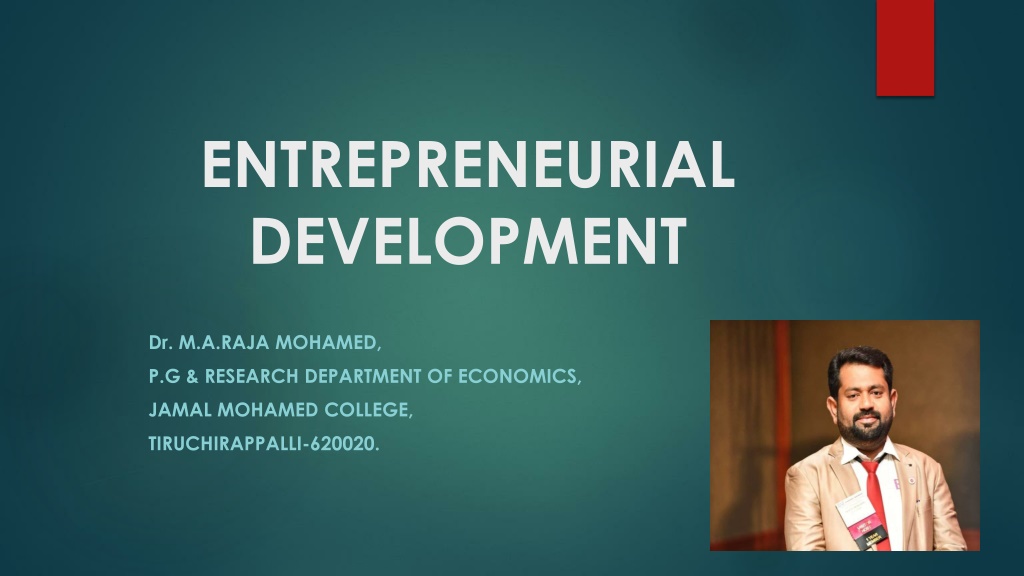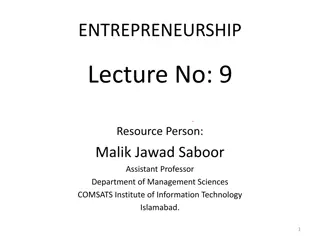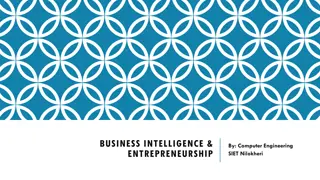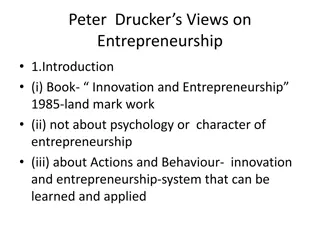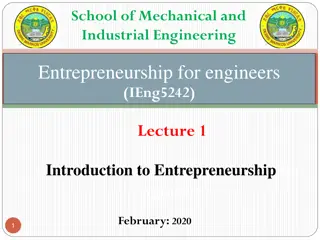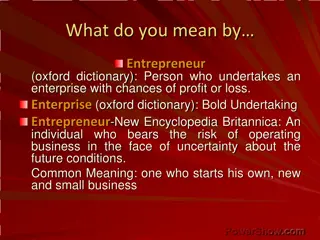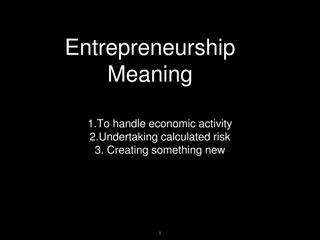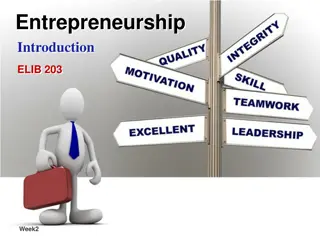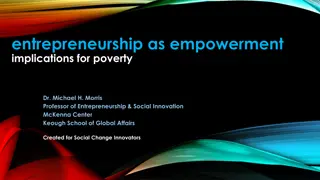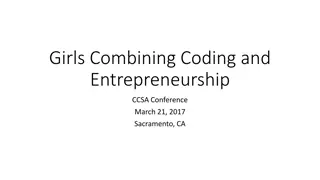Understanding Entrepreneurship: Origins, Definitions, and Characteristics
Entrepreneurship is a vital aspect of economic growth and development. This text explores the origins of entrepreneurship, defines it through the lens of prominent figures like Richard Cantillon and J.B. Say, and outlines the key characteristics and functions of successful entrepreneurs. It sheds light on the evolution of the term from military and engineering contexts to its modern economic connotations, emphasizing the entrepreneurial spirit as a driving force behind innovation, wealth creation, and job opportunities.
Download Presentation

Please find below an Image/Link to download the presentation.
The content on the website is provided AS IS for your information and personal use only. It may not be sold, licensed, or shared on other websites without obtaining consent from the author. Download presentation by click this link. If you encounter any issues during the download, it is possible that the publisher has removed the file from their server.
E N D
Presentation Transcript
ENTREPRENEURIAL DEVELOPMENT Dr. M.A.RAJA MOHAMED, P.G & RESEARCH DEPARTMENT OF ECONOMICS, JAMAL MOHAMED COLLEGE, TIRUCHIRAPPALLI-620020.
ENTREPRENEUR: The word entrepreneur is derived from French word entreprendre which means to undertake The term was first coined by RICHARD CANTILLON, a French baker in 18th century to mean a person who is uncertainty entrepreneur is an organiser who combined various products of factors to produce a socially viable product
ORIGIN OF ENTREPRENEUR : In the 16th century it was refer to person engaged in millitary journey. In 17th century it was extended to the person engaged in engineering activities like construction etc. In 18th century it was used to refer to persons engaged in economic aspect of human activities.
DEFINITION: Entrepreneur is an agent who lays means of production at certain prices in order to combine in to a product that he is going to sell at prices that are uncertain out the moment at which he commits himself to his costs. -RICHARD CANTILLON
DEFINITION: An entrepreneur is the economic agent who unites all means of production the labour, the capital or land and who finds the value of product which results from their employment, the reconstruction of the entire capital that he utilises and value of wages, interest and the rent that he pays as well as profit. belonging to himself -J.B SAY
CHARACTERISTICS OF SUCCESSFUL ENTREPRENEUR: Innovator Emotional balance Risk taker Hard work Good organiser Decision making Optimistic Patient Foresight Communication skill Visionary Leadership and team spirit Self confident Interpersonal skill Perseverance Creative
FUNCTIONS OF ENTREPRENEUR: Initiating and leading business activities Allocating employees duties Forecasting business changes Identifying business opportunities Creating and sharing wealth Improving the standard of living Creating jobs
TYPES OF ENTREPRENEUR: INNOVATIVE ENTREPRENEUR: An Innovative Entrepreneur is a person who creates and implements new ideas, products, or services in order to bring about positive change in the market and society.
EXAMPLES: Mark Zuckerberg Co-Founder of Facebook Elon Musk CEO of Tesla Motors
ADOPTIVE OR IMITATIVE: Imitative entrepreneurship refers to the process of creating a business by copying or adapting an existing concept or business model. These entrepreneurs take an existing business idea, product, or service and replicate it. This is often done with slight modifications in a different market or location.
FABIAN ENTREPRENEURS: Fabian Entrepreneurs are characterized by their cautious approach to business, prioritizing stability and long-term sustainability over rapid growth. They are risk-averse, preferring gradual innovation and relying on proven methods and thorough market research before making strategic decisions.
DRONE ENTREPRENEURS: A droneentrepreneur is someone who sticks to traditional methods and resists the adoption of new technologies. They prefer the comfort of familiar practices over the uncertainty of innovation.
ON THE BASIS OF MOTIVE, ENTREPRENEUR MAY CLASSIFIED INTO THREE TYPES: Managing entrepreneurs who chief goal is security. Innovating entrepreneur who want excitement. Controlling entrepreneur who above all desire.
